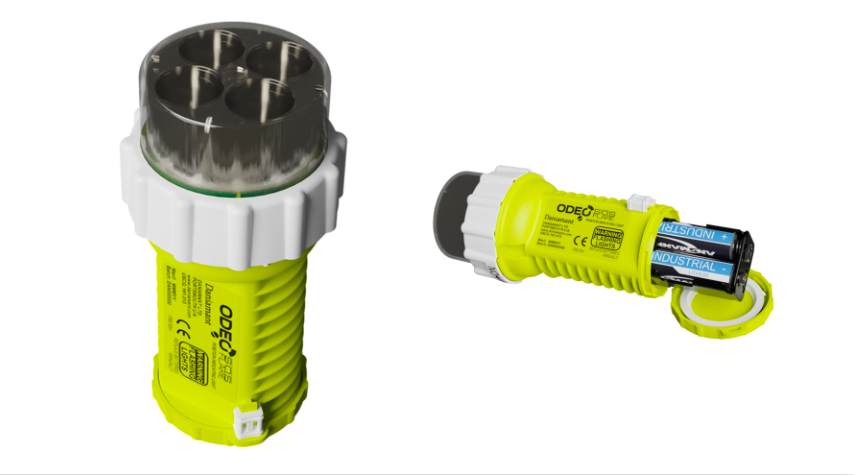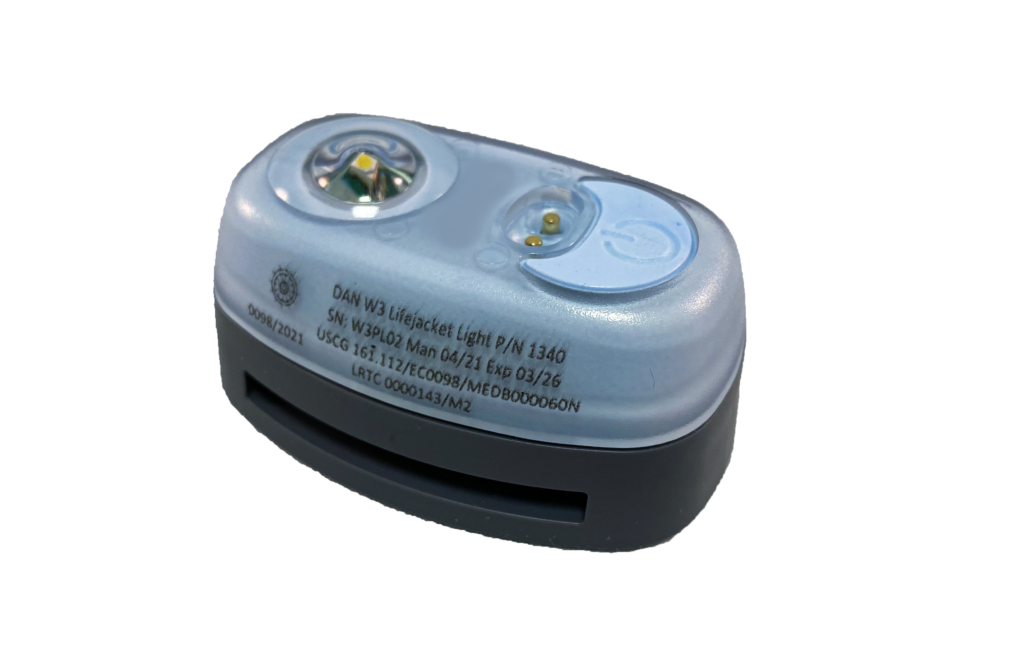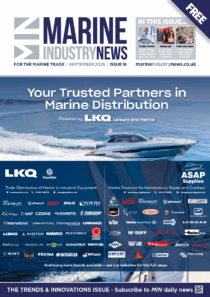Brexit regulations are stifling the UK marine industry, says Daniamant

MIN sits down with Kevin Rough, Daniamant’s CEO, to hear about out-of-sync regulations and certification costs stifling marine manufacturers.
“The movement of goods into the EU has become more bureaucratic, with more paperwork and more cost,” states Kevin Rough. He doesn’t mince his words about the pain which Brexit has put the UK’s marine manufacturers, importers and exporters through.
“Brexit has resulted in more red tape not less, that is not hearsay, that is a fact. If, as a UK manufacturer, you export into the EU, you have to adhere to all applicable EU regs. So we now basically have to adhere to EU, and UK, regulations.”
Daniamant is a Denmark-based company that is best known for manufacturing safety equipment and has recently acquired Jotron’s Marker and Strobe Lights. In 2006 it acquired McMurdo Survivor Location Lights, and established Daniamant UK, based in Portsmouth. That’s where Rough unpicks the ongoing legislation and calculates the costs per existing – and new – product.
Brexit’s impact on marine safety legislation unpicked
Post-Brexit, EU legislation was basically mirrored into UK legislation, Rough explains.
But, since 1 January 2023, any EU Marine Equipment Directive (MED) approved safety product (commonly referred to as Ships Wheel approval) also has to be approved to the new UK Marine Equipment Regulation (MER), known as Red Ensign approval . . . . if it’s to be used on a UK-flagged commercial vessel – whether it’s a merchant ship, passenger vessel, fishing vessel or commercially operated leisure craft.
That all seemed straightforward at first read, but a couple of years on?
“Now the EU and UK regs are becoming out of sync in both date of issue, and content. It is more and more difficult to adhere to both,” Rough says.
Last year Daniamant updated all its certificates in line with the 8th edition of MED. That came into force in September 2024. So now Daniamant can show Declarations of Conformity to customers (and surveyors). But meanwhile the UK’s Red Ensign is four months behind MED, with a planned implementation date of 31 January 2025 – the Maritime and Coastguard Agency has just closed its comment process on the proposals.
But all this means that Daniamant will have to update its certificates again to reflect MER’s latest version when it comes out.
“Ironically,” says Rough, “we don’t have to update our certificates as the version of the MED or MER that we approved the product to at the time is valid until the certificate expires in five years (normal expiry date). But, in practice, the customer and surveyor demand to see the latest regulations reflected on all paperwork pertaining to the product approval.”
Making matters worse, Rough notes that there is a new proposed MSN 1874 Amendment 11. That means the UK’s MER is likely to change again mid-2025. “Some of the clauses could change, or the UK might not deem some elements of the MED relevant for MER. What was one harmonised European standard has become two standards, out of sync, more admin, more cost . . . and for what?” he asks.
UK and EU regulations for marine products
MED and MER aren’t the only compliances in the mix.
There’s also the EU’s ATEX, which allows product to be used in atmospheres in the EU such as on chemical tankers. Now the UK’s UKEX allows the same in the UK.
Then there’s the UKCA mark which needs to be placed on equipment for potentially explosive atmospheres (UKEX), and the CE mark to be placed on equipment for potentially explosive atmospheres (ATEX).
“As a simple example, some of our products have so many references and logos on for compliance it is difficult to even see them,” Rough says.

He cites time spent reading, and then understanding, and then implementing the paperwork around the regulations, as onerous.
As an added factor in the Brexit mire, Rough mentions Notified Bodies (NBs). These are specialised entities who look after harmonising testing standards and certification on behalf of the EU. After Brexit, Daniamant had to appoint a UK NB to issue new certificates for the above UK regulations. But, the company also had to utilise a NB in Europe for the above EU Directives, which meant reissuing all Daniamant certificates so they originated in the EU.
“This was, and still is, a significant cost,” says Rough. “Each product requires certification and we have approx 34 products at approximately €3k per certificate. Each product requires a declaration of conformity (we cannot make a dual declaration), double the administration for us as a manufacturer and for our customers who legally have to keep the declarations.”

Brexit penalises UK marine manufacturers for being innovative
Rough calculates that Brexit’s certification costs are now: “basically double what they were.”
Plus, there are now two standards to audit against – so those costs have doubled too.
“It feels that you are penalised for innovation. The more products a manufacturer has, the more the regulatory, certification and audit costs.”
He fears this will stifle innovation across the marine industry.
And, to add insult to economic injury, Rough says no one is policing the regulations.
“We still see products on UK-flagged vessels that do not comply with the new MER regs,” he says. “There is a competitive disadvantage to following all the legislation — due to costs involved to be compliant.”
But that doesn’t stop Daniamant spending the time and money to do the right thing.
“You have to be compliant and hope your customers are also compliant,” Rough says, but he notes that not all are, especially from lower-cost countries.
Part of the problem is lack of information and advice.
“You have to find out things yourself – there’s no industry feedback into what works.” With this in mind, Rough advocates joining trade associations where upcoming legislation is communicated to members. He lists personal associations such as IOD, IEMA, IOSH, IoE, CMI, etc and trade associations such as ILAMA, CIRM, and RTCM.
Costs associated with Brexit for marine manufacturers like Daniamant – and its customers
“Brexit also had an influence in the acquisition of Jotron’s marker lights,” Rough details. “We decided to put the manufacture and supply of these new products into Denmark, and not the UK.
“The majority of the customers for these products are based in the EU and if we had moved manufacture to the UK, those EU customers would now be treating the sale as an import. That would come with associated increased costs and paperwork to import from the UK. By moving it to Denmark our customers can still enjoy the free movement of goods.
“The promise of customs’-free, and friction-free, trade between UK and EU has not happened,” says Rough. He says some of Daniamant UK’s smaller customers – importing perhaps £100 an order – are now finding some of the costs doubling. That means they’ve switched alliances to competitors in Europe to avoid costs (such as custom duties).
Although many of Daniamant’s products do not attract duty, there are also increases costs due to new tariffs. “The main increase in customs’ costs comes from the ‘rule of origin’ tariff. That applies to the import of goods from the EU which were originally made, or contain components made, outside of the EU. The increased cost of customs duties places further burden on UK businesses.
“Importing goods from the EU has also become far more complicated and time-consuming for UK businesses due to the bureaucracy involved. Daniamant has Authorised Economic Operator status, this is a decision we took to help make border processes more efficient as a pre-approved business recognised as low risk (another cost however),” Rough explains.
(Authorised Economic Operator status is an internationally recognised standard. It shows a business’s role in the international supply chain is secure and has customs control procedures that meet set criteria.)
“I can see how Brexit has not impacted many organisations on a micro basis, but on a macro basis – those who previously and currently deal with international trade and regulations have, in my opinion, seen no benefit,” he concludes.













